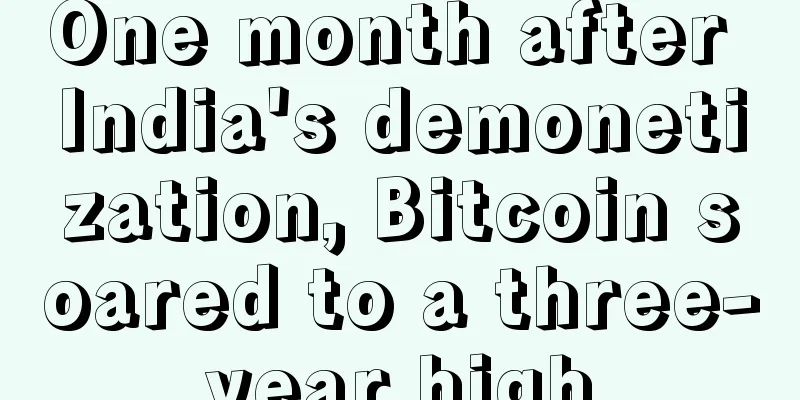One month after India's demonetization, Bitcoin soared to a three-year high

|
On November 8, Indian Prime Minister Narendra Modi announced the abolition of two large-denomination banknotes of 500 and 1,000 rupees. This "banknote demonetization campaign" suddenly turned cash, which accounts for 86% of India's total currency circulation, into "waste paper". In recent days, a large number of Indian people have crowded into nearby bank branches, and the queues at ATMs have also stretched to the streets. Now, one month has passed, and the Indian economy has begun to be affected. In India, 90% of transactions are completed in cash, and the cash/GDP ratio has reached 12%, which is about four times that of BRICS countries such as Brazil, Mexico, and South Africa. Due to the slow progress of the new banknote exchange, the real estate industry, which requires a large amount of cash to complete transactions, has been severely impacted, while Bitcoin has taken advantage of this to soar to a new high in nearly three years. The demonetization order makes Bitcoin the new favorite in India Bitcoin is a virtual currency. Unlike traditional currencies, Bitcoin is not issued by a specific institution. Users obtain Bitcoin through "mining" with complex algorithms using professional computers, commonly known as "mining machines". In order to control the overall issuance of Bitcoin, the inventor Satoshi Nakamoto stipulated that the production of Bitcoin would be halved after every 210,000 blocks when designing the Bitcoin system. On July 9 this year, Bitcoin announced its second halving, with the reward for each block reduced to only 12.5 Bitcoins. As the total amount of Bitcoin increases, the speed of new coin creation slows down until the total upper limit of 21 million is reached. India is extremely polarized between the rich and the poor. Since most financial transactions are done in cash, this provides conditions for tax evasion and promotes the growth of the "black economy", which is why Modi decided to "take drastic measures". At the same time, in order to eradicate the root of the problem, India also requires heavy taxes on deposits that cannot prove the source of income. Therefore, many Indians thought of Bitcoin, which has "advantages" such as anonymity, security, and difficulty in supervision. Bitcoin is based on the blockchain protocol, that is, if Bitcoin is regarded as currency, then the blockchain is the bank, which maintains absolute fairness. This characteristic also determines that Bitcoin transactions are synchronously backed up on millions of servers around the world and cannot be tampered with. The so-called anonymity means that anyone can create a wallet, which is equivalent to a bank account, but there is no need to leave personal information, but this also makes it the best tool for illegal activities such as drug trafficking and money laundering. Trading platform risks cannot be ignored Although the Bitcoin network is relatively safe, Bitcoin trading platforms are vulnerable. Trading platforms are usually websites that may be hacked or shut down by the competent authorities, and user assets face the risk of huge losses or even total loss. On February 28, 2014, Mt.Gox, the world's largest Bitcoin exchange operator at the time, announced that it had filed for bankruptcy protection with the Tokyo District Court of Japan because 850,000 Bitcoins on its trading platform were stolen. According to the trading market at the time, the loss was estimated to be about US$467 million. On August 3 this year, Bitfinex, an online Bitcoin exchange located in Hong Kong, was hacked and the exchange suspended all trading activities. The company confirmed that 119,756 Bitcoins were stolen, worth US$72 million. The company then announced a solution, and the losses must be spread across all accounts. It was estimated that customer accounts would lose 36.067% of their funds. Huge fluctuations from heaven to hell There is no market that only goes up and never goes down. Fluctuations are inevitable, especially for a market with a total market value of only tens of billions of dollars. In April 2013, a debt crisis broke out in Cyprus, and the price of Bitcoin exceeded $250 for the first time. In November 2013, the United States publicly recognized the legality of Bitcoin for the first time. At the end of the month, Bitcoin broke through the $1,000 mark and was close to the price of one ounce of gold. In December 2013, the People's Bank of China banned Bitcoin, and domestic third-party payment institutions began to not support transfers and withdrawals on Bitcoin trading platforms. The price of Bitcoin once plummeted by nearly 60%, but eventually rose 53 times that year (around $13.59-$730). In 2014, the Bitcoin market collapsed, with a 57% drop throughout the year, and the bear market dominated the world. In February, major Bitcoin trading platforms (Bitstamp, Mt Gox, BTC-e, etc.) suffered a large-scale distributed denial of service attack (DDoS attack), and Bitcoin fell 35% during the Spring Festival. In April, Zhou Xiaochuan, governor of the People's Bank of China, said that Bitcoin was not like a payment currency and could not be banned. On May 10, China held the Global Bitcoin Summit. Since then, Bitcoin has successfully doubled in a month and a half, but after hitting the second highest point of the year in June, it has been falling all the way. At that time, the US government seized 29,600 Bitcoins worth $18 million when it auctioned online the world's largest online black market "Silk Road". After that, Dell, Paypal and Microsoft successively announced that they would accept Bitcoin transactions. In the end, Bitcoin closed at around $310 that year. The attached figure is excerpted from Coinbase's report. In 2015, the Bitcoin market was depressed at first but then rose. The price rose by nearly 40% throughout the year, leading the world. Less than half a month into the new year, Bitcoin suffered a heavy blow, plummeting by 37%. On January 14, it plummeted by 20%, the largest single-day drop in two years, and fell below the $200 mark for the first time since October 2013. At that time, the Bitstamp platform was hacked, and nearly 19,000 Bitcoins were stolen, causing the market to panic. Buffett also suggested staying away from Bitcoin, believing that Bitcoin is just a way to transfer money and its intrinsic value is almost zero. On August 19, the Bitcoin trading platform Bitfinex's quotation experienced a "flash crash", and the price of Bitcoin fell by nearly 14% within 30 minutes. On October 22, the European Court of Justice ruled that transactions of Bitcoin and other virtual currencies would be exempt from value-added tax (VAT). Bitcoin recovered its losses that month and hit a high of more than $480 in November. In the end, Bitcoin closed at around $430 that year. In 2016, Bitcoin experienced a "bull run" again. Before May this year, Bitcoin was trading around $450, with a stable trend. As the onshore RMB closed below the 6.50 mark on May 13, Chinese buyers began to enter the market. The two major Bitcoin trading platforms, Huobi and OKCoin, accounted for nearly 90% of the total global Bitcoin trading volume. Bitcoin also rose by nearly 80% in a month, approaching $780. Since then, under the influence of the Brexit referendum in the UK, the attack on the decentralized organization The DAO of the competitor Ethereum, and the theft of nearly 120,000 Bitcoins from Bitfinex, the price of Bitcoin fell by 1/4 from its high point at the end of September. Since October, the RMB has weakened again. As the RMB/USD continued to hit a six-year low, Bitcoin has risen again driven by Chinese buyers. Now, with the participation of Indian "tycoons", Bitcoin has successfully hit a new high for the year, and is currently up 75% from last year's closing price. |
>>: Dutch city trials blockchain for real estate contracts
Recommend
How to analyze luck through face reading
Everyone hopes to have good luck, and everyone ho...
What does a man with fox eyes represent?
Fox eyes are generally a hot topic in women's...
What is a man with a mole on his nose like? Is it good to have a mole on your nose?
What does it mean when a man has a mole on his no...
What does a woman's red face mean?
Many people use physiognomy to see what their com...
How is the fortune of people with moles on their ears?
Among the five senses, the ear is the external or...
People with these features always want more.
An unsatisfied mentality can indeed make a person...
The most vengeful faces
The most vengeful faces 1. Eyebrows are messy and...
Analysis of the luck of women with small hands
Nowadays, many women have small hands, but they d...
People born with double chins are popular
People born with double chins People born with do...
The company borne the loss of 60 million yuan by itself and ruled that the contracts of multiple virtual currency trading disputes were invalid.
After the "September 24 Notice", more a...
What does a triangle in the middle of your palm mean?
There are many lines on our palms, and they are o...
Is Kazakhstan still a popular destination for miners due to its electricity tax?
In May and June, China's boycott of cryptocur...
Four facial expressions determine your life fortune
Four facial expressions determine your life fortu...
Filecoin Survey: Big overseas reputation but few participants, which fork coin is popular?
Text | Nancy Editor | Tong Producer | PANews Afte...
Dating expressions reveal a man's heart
Dating expressions reveal a man's heart Datin...









